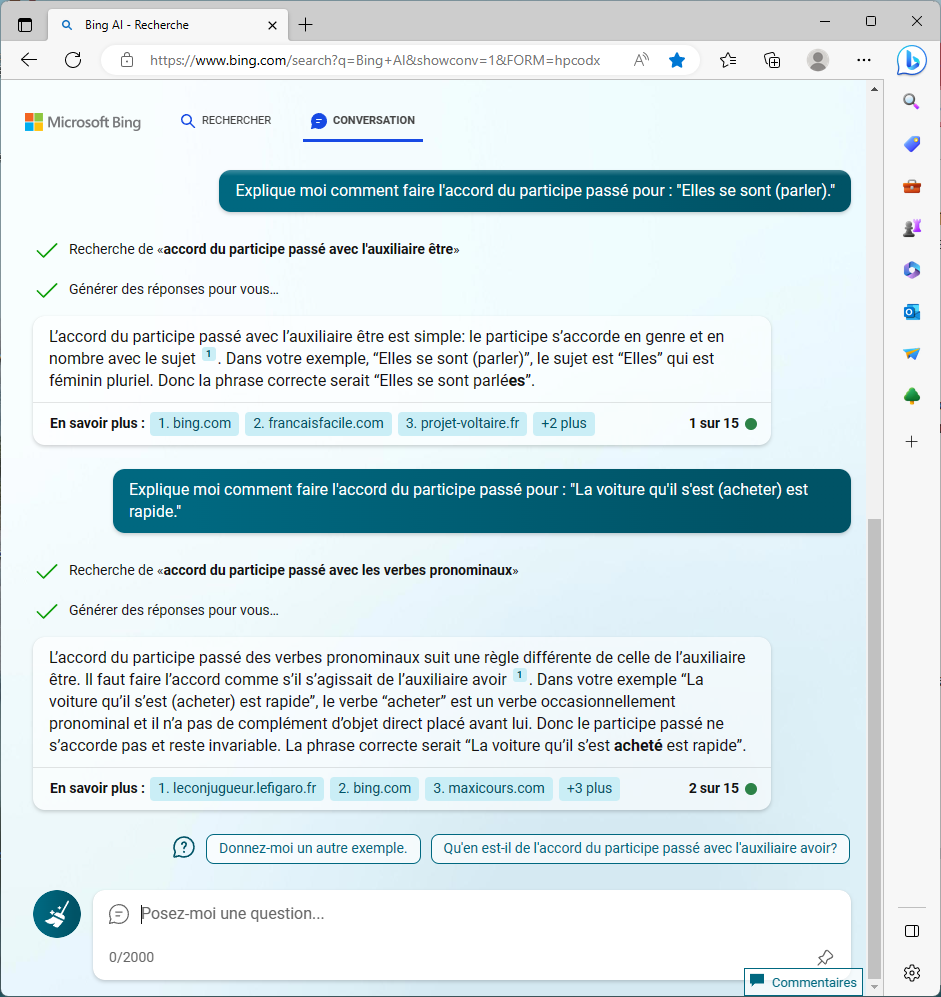
The AI should be publicly accessible, not designed explicitly for answering grammar related question, like ChatGPT today.
AI should respect the rule and also explain it, with a prompt like:
Explique moi comment faire l'accord du participe passé pour : "La lettre qu'il a (recevoir) hier lui a fait plaisir."
Current result here with ChatGPT is a correct application of the rule but with a very wrong and self-contradicting explanation.
The AI should be able to explain and apply all the rules, including exception, describe here.
This is notoriously difficult, however in France a teacher would consider you dumb if you make an error.

Bing is no fool and search the web before responding. However it is not able to apply the rules correctly, here are two mistakes in a row.
Correct results should be:
"Elles se sont parlé." Il n'y a pas d'accord car le pronom réfléchi est un complément d'objet indirect
"La voiture qu'il s'est achetée est rapide". Le complément d'objet direct (la voiture) est placé avant de verbe donc il y a accord du participe passé.
The rule is so hard... I personally think mistakes in French spelling or grammar should be explicitly allowed by the law.
GPT-4 from API does it correctly for this example >50% of the time. Keep in mind, we are talking about a model where 92% of its training data was English. If the amount of data is increased multiple times for upcoming models (and it likely will be) then I can't see this not being solved. The real question is whether a model with significantly more training data comes out by 2025. I'll go with YES.
@ShadowyZephyr Master is a strong word, I have explained it with a precise goal in the description as : "The AI should be able to explain and apply all the rules, including exception", describe here (...)
Sure it is weak for now. 50% of error on a simple case is very weak. Of course there is less training material in French than in English. However it still write French quite well. Of course one issue is that in the training data, some corner cases are not so frequent, and also there are sometimes errors...
You can get the explanation with the prompt example I have proposed : "Explique moi comment faire l'accord du participe passé pour ..." That means "Explain to me how to make the agreement of the past participle for..."
I expect that with only a scaling up LLM technology, it may continue to fail, as LLM often fail at even simple reasoning and to be able to apply and explain the rule, you need some reasoning.
I gave quite a lot of time with "end of 2025", still two years and a half, at AI progress scale that's like a century. So maybe it will resolve to YES.
People here see the (very real) successes of recent AI achievements. They tend to be blind to the failures, that are also quite real. They expect progress to be lighting fast and enormous. They see a huge potential as it it were already given. So I bet against that, because there is a lot of hype and at the end only a part of this potential will be realized. Maybe half, maybe one tenth.
Like I said, GPT-4 can explain it more than half the time for this specific example. If GPT-5 is released within the time frame, it will almost certainly be good enough.
@Zardoru Internet searches surprisingly make it worse, because the first result likely does not mention the exception.
@Zardoru
Rephrasing the prompt to avoid it basing its result off the search also fixes it. We haven't got to mastering it yet, but we are quite close.
@jonsimon It would still be specialized. I would consider the successor of ChatGPT or a direct competitor.